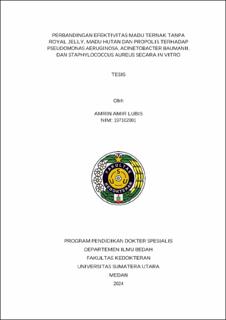Perbandingan Efektivitas Madu Ternak tanpa Royal Jelly, Madu Hutan dan Propolis terhadap Pseudomonas Aeruginosa, Acinetobacter Baumanii, dan Staphylococcus Aureus secara in Vitro
Comparison of The Effectiveness of Livestock Honey without Royal Jelly, Forest Honey and Propolis Against Pseudomonas Aeruginosa, Acinetobacter Baumanii and Staphylococcus Aureus in Vitro

Date
2024Author
Lubis, Amrin Amir
Advisor(s)
Buchari, Frank Bietra
Tarigan, Utama Abdi
Metadata
Show full item recordAbstract
Introduction : This study investigates the effectiveness of Nusantara pure honey, wild honey, and Manuka honey (referred to as " efi honey " in the document) against common bacteria in burn wounds, highlighting the unique antimicrobial properties of each type.
Methods : Employing and in vitro experimental design, the research evaluates the antibacterial effectiveness of livestock honey without royal jelly, forest honey, and propolis against Pseudomonas aeruginosa, Acinetobacter baumannii, and Staphylococcus aureus. The study was conducted in a microbiology laboratories with adherence to ethical standards.
Results : The study did not observe any antibacterial effect from either livestock honey without royal jelly or forests honey. However, propolis showed an antibacterial effect, particularly significant against Pseudomonas aeruginosa at 100% concentration, indicating its potential as a superior antibacterial agent in this context.
Discussion : The findings suggest that while some forms of honey did not exhibit antibacterial properties under the study conditions, propolis demonstrated a significant effect, emphasis the potential for propolis in antimicrobial applications, especially against biofilm- forming bacteria.
Conclusion : Propolis exhibits a strong antibacterial effect against specific burn wounds pathogens, particularly Pseudomonas aeruginosa, underscoring its potential in burn wounds management
Collections
- Master Theses [204]
